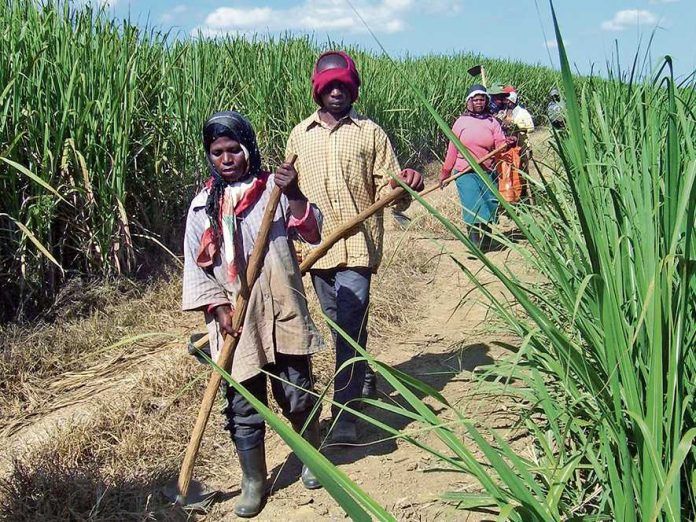Johannesburg – When two KwaZulu-Natal small-scale farmers quit their full-time jobs and decided to invest their retirement savings in the sugarcane industry, they believed the move was the creation of generational wealth for their families, not knowing that they would soon regret their decision.
Mzomuhle Gumbi of KwaMazitapele village under Mandeni local municipality on the KwaZulu-Natal north coast is one livid small grower who said the sugarcane investment had turned sour because of the severe shortage of milling capacity in the region.
“I would safely say that it has been a bloodbath for small-scale sugarcane growers who are predominantly black. The closure of the Darnall sugar mill had a devastating effect because it was closer, so we were saving on transportation costs. We then had to divert our sugarcane to Amatikulu, which is a distance away. But now, we have been told that the mill cannot cope with the capacity. This means thousands of tons have to be discarded and go to waste,” said Gumbi.
He added that complicating their woes further was that most small growers harvested once a year, saying other growers had not recovered since the Covid-19 outbreak.
“We have a massive debt to service. In my case, I have lost two tractors, which were repossessed because I couldn’t service the debt. This situation has severely affected my family life because we rely on the sugarcane business for survival. I had to sell one of the family vehicles just to stay afloat. It is a depressing situation,” he said.
Gumbi, a retired teacher, used his entire savings to venture into the sugarcane industry, Years later he has nothing to show for it.
Last year, giant sugar producer Tongaat Hulett announced that it was closing down the Darnall sugar mill on grounds that it was reducing production costs. The sudden announcement was a trickle-down effect of accounting irregularities, which rocked the sugar producer in 2019. It sought to use the mill closures and the layoff of hundreds of workers to save itself from total collapse.
For many years, emerging black sugarcane farmers, mainly beneficiaries of land reform, had relied on the sugar mill for their produce.
Norman Cele, another emerging sugarcane farmer based in uMzimkhulu on the province’s south coast, also paints a gloomy picture of small-scale growers in desperate need of government intervention.
“During the July protests, many of our fields were set alight. Small farmers are bleeding money. The Sezela sugar mill, which we now rely on for crushing, has been turning us back, complaining that the sugarcane we are giving them has expired. They also tell us that the mill is too small to cater for everyone,” said Cele.
He said the farmers had resorted to retrenching dozens of villagers who solely relied on the sugarcane industry for employment. “These are some of the drastic measures we have to take because we are drowning in debt. This has put many emerging black sugarcane farmers out of business.”

UMzimkhulu sugar mill, owned by Illovo Sugar South Africa, which Cele and other smallholder farmers in the region depended on for years, was also shut down for the 2020/21 season.
Seeing that the challenges for small growers were becoming unbearable, Martha Hlatshwayo of the eDokodweni area in northern KwaZulu-Natal resorted to crop diversification. She said this was the technique she had learned from her father.
“There are massive challenges in the sugar sector especially for small growers like us. When the sugarcane business gets too tough, I have something to fall back on because I have mastered the art of crop diversification.
“Besides sugarcane, I also grow vegetables such as tomatoes, potatoes, cabbage, and spinach. I supply these to various retail shops,” said Hlatshwayo.
She called for an urgent summit to deliberate immediate strategies to rescue the small-scale sugarcane grower’s sector.
Sugar mill boards do not embrace micro cane businesses
The South African Farmers Development Association (SAFDA), an organisation representing marginalised farmers in the sugar industry, pointed to bottlenecks and untransformed mill group boards who fail to embrace black small-scale farmers as equals in the industry.
“You cannot subject small-scale farmers to the so-called daily ratable delivery because their cane is too small.
“The rationing of access to the mill is done in such a way that it is biased to commercial farmers, this is an act of evil,” said SAFDA executive chairperson Dr. Siyabonga Madlala.
“We don’t understand why commercial farmers would compete with small-scale farmers who contribute less than 10% of the gross sugar industry’s production.”
Madlala said that the closure of the two mills had exacerbated the crisis, saying dozens of small-scale farmers would not be able to deliver their production this season.
“They will have no income because mill group boards, which are structures that govern access to mills, do not care about the plight of small-scale farmers.”
He appealed to the government to intervene and change legislation to accommodate small growers.
“In the coming season, we call for the amendment of section 121 of the Sugar Industry Agreement 2000, to include all small-scale grower sugarcane under the special delivery allocations and for this not to be left to the discretion of untransformed mill group boards that bulldoze decisions against the views and the will of our farmers,” he said.
For the latest entertainment news from Sunday World, click here.
Or read the latest from Shwashwi here.
Follow @SundayWorldZA on Twitter and @sundayworldza on Instagram, or like our Facebook Page, Sunday World, by clicking here for the latest breaking news in South Africa. To Subscribe to Sunday World, click here.
Sunday World



